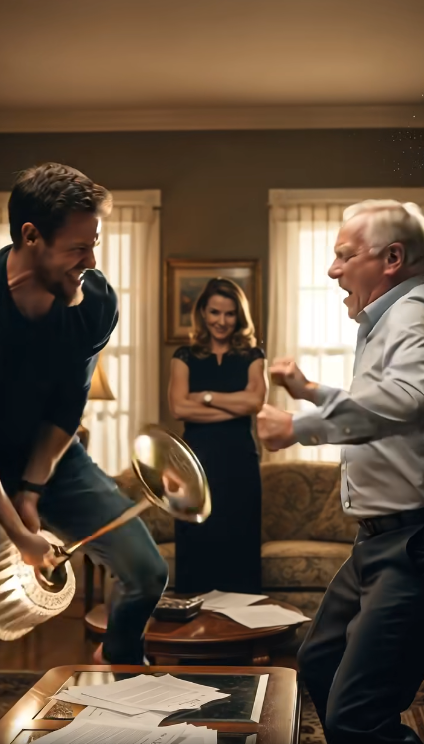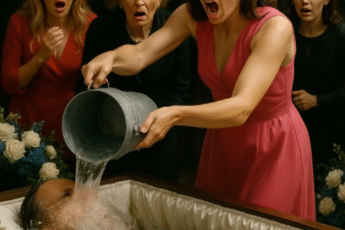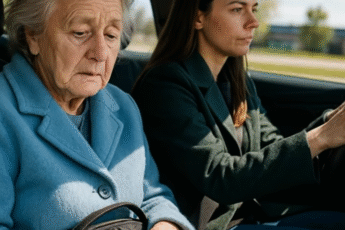My name is Steven, and I am sixty-four years old. I live in a small brick house a short walk from the diner my wife, Donna, and I built with our own hands. People around here say the place smells like Sunday mornings—fresh coffee, butter on a hot griddle, and the cinnamon from the pies Donna used to bake. She was my compass. Her laugh made strangers feel like old friends, and her cooking tasted like a home you never knew you were missing.
We started with a secondhand stove, three wobbly tables, and a dream. But we had each other, and that was enough. We raised our son, Mark, in the middle of that warmth. He did his homework on the counter while I flipped pancakes, and I’d tuck a pencil behind his ear and tell him, “This place belongs to the people who need it.” I thought he’d inherit more than a building; he’d inherit its meaning.
We worked extra hours for his college books and skipped vacations to pay his tuition. When he graduated, Donna cried into my shoulder, the way a mother does when a long prayer is finally answered. And when he fell in love with Skylar, we welcomed her as our own, paying for their wedding reception right here in the diner, under strings of white lights. I gave a small speech about love being a promise you renew in the hard days. Donna squeezed my hand under the table.
After the wedding, life didn’t shift all at once. It drifted. The calls got shorter. Visits turned into messages. I told myself that young people have to hustle, but Donna kept a plate ready for them every Sunday, a fragile hope that refused to shrink to size. Most nights, the plate went cold.
She started getting tired more often, her steps slower. I told her to rest, but she insisted on helping, saying the diner was the heartbeat that kept her alive. One winter night, she collapsed while carrying a tray of pies. I rushed her to the hospital, a fear I’d never known squeezing my chest. The doctors used their clinical words—complications, treatment, monitoring—but all I could hear was the sound of her breathing, shallow and fragile.
I called Mark. I left messages. I begged him to come.
“Your mother needs you,” I said into the phone, my voice breaking in ways I hadn’t let him hear since he was a boy.
He never came. Sometimes he didn’t answer. Other times, it was a rushed promise. Sorry, Dad. Work’s been crazy. Maybe next weekend. Soon never arrived. Donna made excuses for him, but I saw the pain in her eyes each time she asked if he’d called back.
I stayed by her side day and night, shutting the diner down early just to hold her hand. Even as her strength faded, she found ways to comfort me. “Steven,” she whispered once, her voice a thread of sound, “don’t stop living because of me. Promise me you’ll keep the diner alive. Keep giving people a place to feel at home.”
I promised, my heart breaking. The night she slipped away, I felt as if half of me went with her.
At the funeral, friends and regulars filled the pews. They asked where Mark was. I had no answer. He hadn’t come. He hadn’t even called. I stood by her grave, a cold wind biting at my face, feeling the weight of betrayal heavier than the soil that covered her coffin.
After that, I moved through life like a man underwater. The diner door still opened, but I was just going through the motions. The truth pressed down on me: I couldn’t run this place forever. And Mark had shown me he had no space in his life for me or for the memory of his mother.
One evening, I saw a young man huddled outside the window, shivering. I gave him a cup of coffee and a slice of pie. As I watched gratitude shine in his tired eyes, I knew what I had to do. The diner and the house would never go to Mark. They would become something larger. I would create a trust in Donna’s name, a foundation to turn the diner into a community kitchen and the house into a shelter for those with nowhere else to go. It would keep her spirit alive.
I confided in my old friend, Peter. He listened, then nodded slowly. “Steven, this is the right thing. You’ve given your whole life to building something. Don’t let greed destroy it.”
His words steadied me. I began to prepare quietly, knowing if Mark and Skylar ever discovered my plan, they would not take it kindly. I told myself I could handle it. But deep down, a small voice whispered that a storm was brewing.
It broke sooner than I expected.
A few months after the funeral, I was locking up when I heard footsteps crunching in the snow. It was Mark, with Skylar by his side. My father’s heart jumped, but the warmth died when I saw the calculation in their eyes.
“Dad,” Mark said, forcing a smile. “We thought we should check on you.”
“We’ve been so worried,” Skylar added, her tone dripping with false concern.
I let them in, and we sat in a booth. Their intentions bled through their words like ink on thin paper.
“You can’t keep doing this forever,” Mark began. “The diner, the house… it only makes sense if you transfer them to me.”
I stared at him, stunned. “Mark, when your mother was sick, you weren’t there. When she passed, you didn’t come. Now you want to take what we built? No.”
Skylar leaned forward, her eyes narrowing. “Steven, you’re being unreasonable. You should be grateful your son is even willing to step in. Be realistic.”
They weren’t here for me. They were here for themselves. In the days that followed, they didn’t leave. They showed up at the diner, followed me home, talking in circles about paperwork. Each time, I refused. Each time, their patience thinned.
The breaking point came on a bitter Chicago evening. They arrived uninvited at my home, and Mark dropped a stack of papers on the coffee table with a loud slap.
“Dad, sign them,” he ordered.
Skylar stood beside him, arms folded. “The house, the diner—they’re ours by right. You can’t take them from your own family for some silly trust.”
I rose slowly, clutching a photograph of Donna, her smile giving me strength. “No,” I said firmly. “When I die, everything will go to the Donna Trust. It will help people who need it, not people who turn their backs on family.”
Mark’s face twisted with rage. “The Donna Trust?” he shouted. “You’d rather give everything to strangers than your own son? After everything you sacrificed for me, you’re going to spit in my face like this?”
“I gave you everything,” I said, my heart pounding. “When your mother was sick, you abandoned us. When she died, you didn’t come. You’re here not to help, but to take.”
Skylar sneered. “You’re a stubborn old man. Mark, show him he doesn’t get the last word.”
Before I could react, Mark grabbed the heavy crystal lamp from the side table. In a flash of fury, he swung it, smashing it against the side of my head. The pain was a blinding explosion. I fell, the world blurring, the photograph of Donna slipping from my grasp. Through the haze, I heard Skylar’s voice, cold and cruel.
“Get out, Steven. This is our house now.”
As she shoved me toward the door, I caught movement outside. My neighbors, Harold and Martha, were standing there, their eyes wide with horror. “Call the police!” Martha screamed.
Sirens cut through the night. Mark froze as officers burst in. They were pinned against the wall, handcuffed, their panicked protests ignored. Paramedics rushed to me, lifting me onto a stretcher. As they carried me out, I looked back at the house Donna and I had filled with love, now scarred by betrayal. But a spark of resolve burned inside me. This was not the end.
The hospital smelled of antiseptic. A nurse told me I was lucky. I didn’t feel lucky. I felt hollowed out. But even as my body lay weak, my spirit began to harden. Don’t let them destroy what we built, Donna’s voice whispered.
Harold and Martha visited, their kindness a lifeline. “We saw everything, Steven,” Harold said firmly. “We’ll testify.”
When I was discharged, I stayed with Peter. Over hot coffee, I told him everything. “You need to fight this,” he said, his eyes burning with anger. “Not just for yourself, but for Donna’s memory.”
The next day, I met with a lawyer, Steven Brooks. “This is elder abuse, plain and simple,” he said after hearing my story. “Assault, attempted fraud, illegal eviction. They thought you were weak, Mr. Hayes. We’ll make sure the court sees the truth.”
For the first time since the attack, I felt the weight on my chest lift slightly. I knew the road ahead would be hard, but I was ready. I would not let them steal Donna’s legacy. I would not let my son’s betrayal be the final chapter of my life.
On the morning of the trial, I walked into the cold, stone courthouse leaning on a cane. When I saw Mark and Skylar, my chest tightened. He looked smaller, his arrogance a poor substitute for character. Skylar held her chin high, unrepentant.
The prosecution laid out the charges. Photographs of my injuries were displayed on a large screen. The shattered crystal lamp was presented as evidence. Harold and Martha took the stand, their voices trembling but unwavering. “We saw it with our own eyes,” Martha said firmly. “They attacked him and tried to throw him out of his own house.”
When it was my turn, I rose slowly. My voice shook at first, then grew stronger as I spoke of the diner, of Donna’s love, of my son’s abandonment, and of my promise to create the Donna Trust. “This diner, this house,” I finished, tears welling in my eyes, “they’re not just buildings. They’re my wife’s memory. And I will not see them turned into trophies for those who abandoned us.”
The verdict came like a release of breath I had been holding for months. Guilty on all counts.
As officers led them away, Mark glanced at me, his eyes full of rage and something that might have been shame. I closed my eyes, Donna’s face rising in my mind. Justice had been served.
A week later, I walked back into the diner. The bell over the door jingled. Peter was wiping down a counter, and Harold and Martha were in their corner booth, waiting. They stood and smiled. “We told you, Steven,” Martha said warmly. “Justice always finds its way.”
With Peter’s help, I set the Donna Trust in motion. The house was renovated, transformed into the Donna Trust Home for Seniors, a safe place for those forgotten by their families. When the sign went up, tears blurred my vision. It wasn’t just a building anymore. It was her legacy.
The community rallied behind it. Volunteers served meals, and laughter filled the halls. I won’t pretend the scars are gone. A part of me still aches for the son I lost to greed. But when I see an old woman smile as she eats a hot meal, or hear a man say, “This place saved me,” I know I made the right choice.
The diner no longer belongs to just me. It belongs to everyone who needs it. This is how my story ends—not in despair, but in triumph. Not in silence, but in laughter echoing from walls built on kindness. And as long as the Donna Trust lives, so does she.




